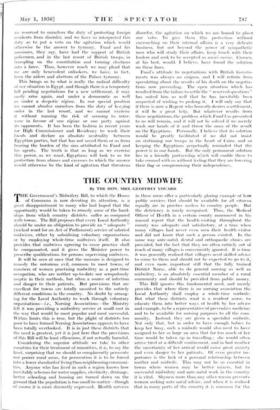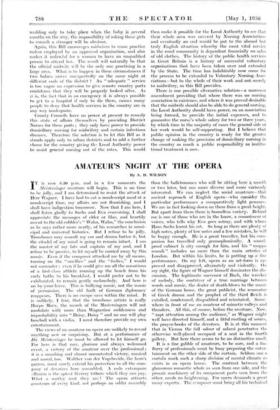THE COUNTRY MIDWIFE
By THE HON. MRS. GEOFFREY YOUARD
It will be seen at once that the measure is designed to remedy the notorious evil, common to most towns, of numbers of women practising midwifery as a part-time occupation, who are neither up-to-date nor scrupulously aseptic in their methods, but often a source of infection and danger to their patients. But provisions that are excellent for towns are totally unsuited to the entirely different conditions in the country. No doubt by arrang- ing for the Local Authority to work through voluntary orgarriSations—i.e., Nursing Associations—the Ministry felt it was providing a midwifery service at small cost in the way that would be most popular and most successful. Within limits this is true, but the plight of districts too poor to have formed Nursing Associations appears to have been totally overlooked. It is in just these districts that the need is greatest, yet it is just here that the provisions of this Bill will be least efficacious, if not actually harmful.
Considering the superior attitude we take to other countries for their treatment of minorities, it is, to say the least, surprising that we should so complacently persecute our, poorer rural areas, for persecution it is to be forced into a lower standard of living than neighbouring communi- ties. Anyone who has lived in such a region knows how inevitably schemes for water supplies, electricity, drainage, better schooling and housing are turned down on the ground that the population is too small to matter—though of course it is more discreetly expressed. Health services in these areas offer a particularly glaring example of how public services that should be available for all citizens equally are in practice useless to country people. But the deficiency is rarely recognised. Thus, the Medical Officer of Health in a certain county announced in his annual report that the health-visiting throughout the county was adequate and satisfactory, at a time when many villages had never even seen their health-visitor and did not know that such a person existed. In the same way ante-natal, dental and orthopaedic clinics are provided, but the fact that they are often entirely out of reach of many villages is conveniently ignored. It is time it was generally realised that villagers need skilled advice to come to them and should not be expected to go to it, and even more important still that the fully trained District Nurse, able to do general nursing as well as midwifery, is an absolutely essential member of a rural community and should be provided from public money.
This Bill ignores this fundamental need, and merely provides that where there is no nursing association the Local Authority shall employ a whole-time midwife. But what these districts want is a resident nurse, to educate them into better ways of health by her advice and example, to be a representative of preventive medicine and to be available for nursing purposes to all the com- munity. Instead, they are given a specialist midwife. Not only that, but in order to have enough babies to keep her busy, such a midwife would also need to have assigned to her so large an area that far too much of her time would be taken up in travelling ; she would often arrive tired at a difficult confinement, and in bad weather the uncertainty of her arrival would cause great anxiety and even danger to her patients. Of even greater im- portance is the lack of a personal relationship between mother and midwife. This may not be so essential in towns where women may be better mixers, but to successful. midwifery and ante-natal work in the country it is yital. Shyness more than any other reason prevents women seeking ante-natal advice, and when it is realised that in many parts of the country it is common for the wedding only to take. place when the baby is ,several months on the Way; the impossibility of 'asking these girls to consult a stranger will be obvious. •• Again, this Bill encourages midwives to cease practice unless employed by an approved organisation, and also makes it unlawful for a woman to have an unqualified person to attend her. The result will naturally be that the official midwife will be the only one practising in a, large area. What is to happen in these circumstances if two babies arrive unexpectedly on the same night at different ends of the district ? An " adequate " service is too vague an expression to give remote country parts confidence that they will be properly looked after. As it is, the 'act that in an emergency it is always possible to get to a hospital if only to die there, _causes many people to deny that health. services in the country arc in any way inadequate.
County Councils have no power at present to remedy this state of affairs themselves by providing District Nurses for these parts ; they only have power to provide domiciliary nursing for midwifery and certain infectious diseases. Therefore the solution is to let this Bill as it stands apply only to urban districts and to add a further clause for the country giving the Local Authority power to assist general nursing out of the rates. This would then make it_. possible for the Local Authority to see that their .whole- area was covered by Nursing Association, and eventually an end would be put to the absurd but truly English situation whereby the most vital service in the rural community is dependent financially on sales of old clothes. The history of the public health services in Great Britain is a history of successful voluntary organisations that have been taken over and extended by the State. The time has indubitably now come for the process to be extended to Voluntary Nursing- Asso- ciations—but to the whole of their work and,not merely to midwifery, as this Bill .provides.-- There is one possible alternative solution—a narrower amendment providing that where there was no nursing association in existence, and where it was proved desirable that the midwife should also be able to do general nursing, the Local Authority should have power, on an association being formed, to provide the initial expenses, and to guarantee the nurse's whole salary for two or three years, by which time in the majority-of cases the general side of her work would be self-supporting. But I believe that public opinion in the country is ready for the greater change of making the provision of domiciliary nursing in the country as much a public responsibility as institu- tional treatment is now.















































 Previous page
Previous page